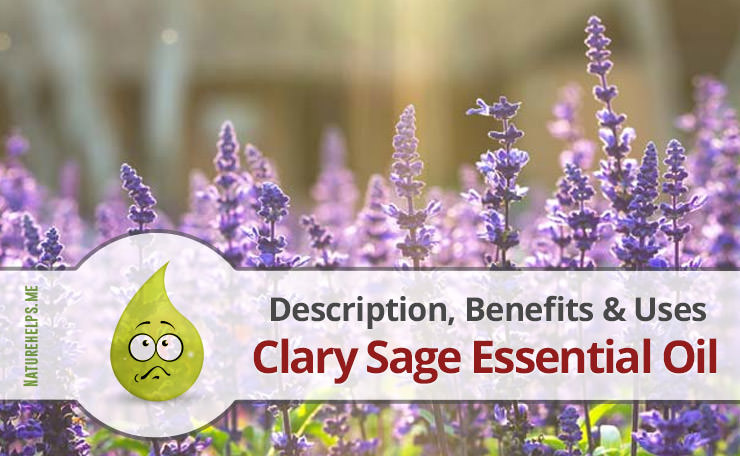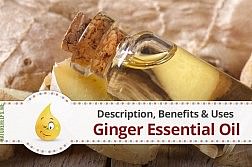Although not a cheap oil, clary sage oil has great benefits – not only for easing depression and nervous burn-out, but for a host of female complaints and for relieving congested complexions.
The plant is seen growing in the wild all over Europe, Russia, and the United States, but was traditionally native to Syria, France, Italy and Switzerland. Clary sage essential oil is extracted by steam distillation from the leaves and buds of the salvia sclarea plant.
It was highly valued during the Middle Ages for its ability to to heal all sorts of eye problems. Called “clarus”, meaning clear, it was later transformed into clary. Part of its Latin name, salvia, means to save. Rightly so, as clary sage enjoys a reputation as a sort of “cure all” because it quite literally is used successfully to restore health in a variety of areas. Egyptians loved clary sage for its purported ability to cure infertility.
Effects & Actions of Clary Sage Oil
Effects of clary sage oil on internal organs and systems
- antidepressant
- aphrodisiac
- astringent
- digestive
- hypotensive
- stomachic
- sedative
Indications in Usage of Clary Sage Oil
Clary Sage Oil to Treat Hormonal Imbalance: Effective against PMS, painful periods, menstrual irregularity, symptoms of menopause and labor. Clary Sage is also a uterine stimulant and an emmenagogue that promotes menstruation when delayed, scanty or completely absent. When massaged over the abdomen during periods, its spasmolytic and analgesic action on the uterus can relieve menstrual cramps.
Clary Sage Oil as Aphrodisiac: Stress-busting and deeply relaxing properties make it a powerful natural aphrodisiac. While it fuels desire and masculinity in men, its profound characteristics stimulate sexual desire and confidence in women. The oil also helps overcome frigidity, inhibition or anxiety that may come in the way of a fulfilling healthy relationship.
Natural Treatment of Digestive Disorders: due to its calming effect on muscles and its ability to prevent a build-up of gas in the digestive tract. It can encourage the production of gastric juices to make the digestive function more efficient.
Clary Sage Oil to Prevent Ulcers: The anti-bacterial action of the oil can help to keep infections at bay. The herb can be used as an ingredient in skin care preparations and will help to balance the skin’s oil production.
Clary Sage Oil to Reduce Blood Pressure: Hypotensive is the antonym of Hypertensive. Studies have shown this oil to be very effective in reducing blood pressure by relaxing the veins and arteries, thereby reducing the risk of heart attacks, strokes, atherosclerosis, and brain hemorrhaging. By reducing blood pressure, it also widens the blood vessels and allows for increased circulation, resulting in increased oxygenation to the muscles and organ systems, boosting their performance and overall metabolic performance.
Natural Stress Relief: Aromatherapy is linked with relaxation and stress-relief in many of our minds, even before we become familiar with essential oils. I know that’s all I knew of them at first! But certain oils are more effective than others, and clary stage stands out. In fact, when a group of essential oils were tested for antidepressant abilities, clary sage showed far and away the most potential, indicating it as a potential stand-alone treatment thanks to dopamine regulation.
How to Use Clary Sage Oil?
- To treat symptoms of anxiety, decreased libido, depression, insomnia, menopause, nervous tension, and stress: use 2-3 drops as a vapor therapy, or use in a diffuser or lamp ring. Can also add 2-3 drops to a carrier oil and massage on body.
- To relieve back pain, neck strain, and skin problems: mix 2-3 drops of oil with 2-3 tablespoons of liquid lanolin and apply to problem areas for relief.
- To reduce discomfort associated with menopause or premenstrual syndrome: use 4-5 drops in bath water for a relaxing soak. You can also use 2- 3 drops on a handkerchief and inhale during time of discomfort. However, do not inhale for long periods of time, as prolonged exposure could cause a headache.
- For respiratory problems, place 2-3 drops of oil in a diffuser or lamp ring.
Blends well with: anise, bergamot, cedarwood, citrus oils, clove, frankincense, geranium, grapefruit, hyssop, jasmine, juniper, lavender, lime, marjoram, nutmeg, palmarosa, patchouli, pine, rose, tangerine, tea tree, and thyme.




